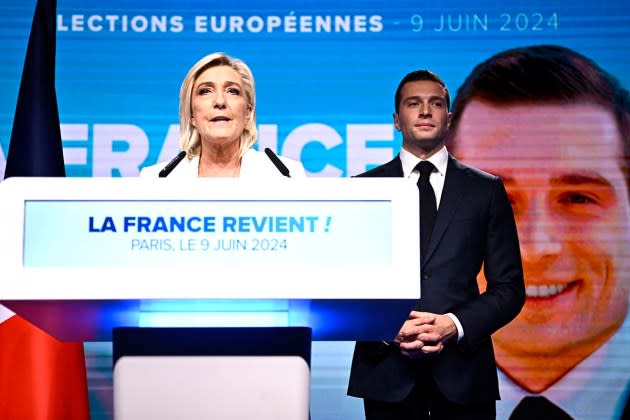French Film and TV Business Braces for Fallout as Possibility of Far-Right Wins Loom in Upcoming Elections

The historic gains of the French far-right party Rassemblement National (National Rally, or RN) during the European elections on June 9 and French President Emmanuel Macron’s shock decision to dissolve the National Assembly have not only propelled the country’s film and TV industry into a state of panic but are causing ripples across the economy.
Boasting the second-biggest economy in Europe, France saw its stock exchange take a hit this week amid talks that Marine Le Pen’s far-right party had a solid chance of performing strongly in the parliamentary elections set for June 30 and July 7. The three biggest banks in France, BNP Paribas, Credit Agricole and Societe Generale, have lost between 12-16% in value this week, according to Reuters.
More from Variety
In addition to bank stocks that have slumped, concerns about the country’s political crisis have also driven the biggest weekly jump in investor demand for government bonds since 2011, amid the euro debt crisis, per Reuters. The CAC 40 equity index in Paris also dropped by 2.4%.
The prospects of seeing Macron lose control of the National Assembly and government has had a domino effect on the country’s economic standing. Speaking on the local radio Franceinfo on Friday, finance minister Bruno Le Maire raised the possibility of a new debt crisis in case the Rassemblement National wins the parliamentary elections, drawing hypothetical comparisons with the aftermath of Liz Truss, the former U.K. prime minister whose short 44 day term in office caused a spike in the cost of government bonds in 2022.
While Macron’s pro-business and pro-Europe agenda had reassured investors since he took office in 2017, the Rassemblement National is having the opposite effect. Some of party’s suggested measures include a cut in sales taxes and lowering the retirement age, while its stance on Europe remains blurry.
Francois Godard, senior media analyst at Enders and author of the recently published book “Germany, France and Postwar Democratic Capitalism: Expert Rule,” says France’s standing with international financiers is crucial to the local economy because the “country is Europe’s primary destination for foreign direct investments.” Addressing potential consequences on the French media industry and ongoing consolidation, Godard said “if foreign financiers start deserting, it will put French companies in a difficult situation to borrow money because interest rates will inevitably go up.” France is home of some of Europe’s biggest media groups, including Vivendi, Banijay and Mediawan.
Discussing the potential impact of a far right win on the film and TV industry, insiders say the nationalistic party would certainly attempt to privatize public broadcasting services, including France Televisions. But unlike in Italy, where the country’s far right prime minister Giorgia Meloni gained control of the local broadcaster Rai last year without much of a fight, the Rassemblement National would face tremendous backlash in France where the industry is predominantly aligned with the left and center. “In France, we have a strong culture of public broadcasters, we have celebrated its independence for a very long time, and we have a very active watchdog body Arcom, which wouldn’t allow a government to take it over,” Godard says.
French film and TV producers are already sounding the alarm over the risks of having far right leaders governing the country for the first time since WWII. Xavier Gens, the director of Netflix’s hit shark movie “Under Paris,” says it would be a “catastrophe in general, and a disaster for French cinema.”
Gens argues the far right would dismantle the country’s unique system which allows freelance workers in theater, other live entertainment and movies and TV to receive unemployment benefits.
“What makes French cinema and culture special is our cultural policies that have always preserved auteurs. If we strip down these benefits for freelance workers and privatize public broadcasters we will kill our industry,” said the director, whose credits include “Mayhem!” and “Hitman.” “Our cinema shines everywhere in the world, at festivals and overseas, with films that are vibrant and diverse. If the Rassemblement Nation takes power, it’s the end of everything,” he continued.
In line with other far right parties across Europe, the French far right party, once called Front National, has widened its appeal in recent years after rebranding itself in 2018. Although it’s now marketing itself as a milder, socially engaged and nationalistic party, it’s still driven by a xenophobic ideology.
French producer Daniel Ziskind, who co-produces many movies from the Arab world, such as
Ahmed Yassin Aldaradji’s Venice premiering “Janain mualaqa,” shares Gens’ concerns and fears “an impact on the financing and visibility of world cinema in France.” He says the privatization of French broadcaster France Televisions would also deliver a blow to local and European film biz because it’s a major source of pre-financing for movies.
The snap parliamentary elections will take place in two rounds less than a month before the start of the Olympic Games in Paris. If the Rassemblement National dominates these elections, Macron will have to govern with a prime minister belonging to the far right party until his term ends in 2027. In case of that the outcome, Jordan Bardella, the 28-year-old lead candidate who won the European elections by a landslide with 31.5% of votes, has already been tipped as a potential presidential candidate.
Best of Variety
Sign up for Variety’s Newsletter. For the latest news, follow us on Facebook, Twitter, and Instagram.

